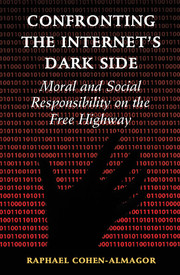Book contents
- Frontmatter
- Dedication
- Contents
- Acknowledgments
- List of Abbreviations
- Introduction
- 1 Historical Framework
- 2 Technological Framework
- 3 Theoretical Framework
- 4 Agent's Responsibility
- 5 Readers' Responsibility
- 6 Responsibility of Internet Service Providers and Web-Hosting Services, Part I: Rationale and Principles
- 7 Responsibility of Internet Service Providers and Web-Hosting Services, Part II: Applications
- 8 State Responsibility
- 9 International Responsibility
- Conclusion
- Glossary
- Selected Bibliography
- Index
Introduction
Published online by Cambridge University Press: 05 July 2015
- Frontmatter
- Dedication
- Contents
- Acknowledgments
- List of Abbreviations
- Introduction
- 1 Historical Framework
- 2 Technological Framework
- 3 Theoretical Framework
- 4 Agent's Responsibility
- 5 Readers' Responsibility
- 6 Responsibility of Internet Service Providers and Web-Hosting Services, Part I: Rationale and Principles
- 7 Responsibility of Internet Service Providers and Web-Hosting Services, Part II: Applications
- 8 State Responsibility
- 9 International Responsibility
- Conclusion
- Glossary
- Selected Bibliography
- Index
Summary
Know from whence you came. If you know whence you came, there are absolutely no limitations to where you can go
–James Baldwin
The Internet burst into our lives in the early 1990s without much preparation or planning and changed them forever. It has affected almost every aspect of society. It is a macro system of interconnected private and public spheres: household, literary, military, academic, business, and government networks. The Internet has produced major leaps forward in human productivity and has changed the way people work, study, and interact. The mix of open standards and diverse networks and the growing ubiquity of digital devices makes the Internet a revolutionary force that undermines traditional media, such as newspapers, broadcasting, and telephone systems, and that challenges existing regulatory institutions that are based on national boundaries.
The Internet's design and raison d’être are open architecture, freedom of expression, and neutral network of networks. In the prevailing Western liberal tradition, freedom of expression is perceived as a fundamental human right requiring the uninhibited free flow of information. This is especially true for the Internet. But soon enough, people began to exploit the Net's massive potential to enhance partisan interests, some of which are harmful and antisocial. Given that the Internet has been part of our lives for a relatively short time, the discussions about it concentrate on the social production and the technological, architectural, and geographic aspects of the Net. (Thinkers in this area include Yochai Benkler, Manuel Castells, Aharon Kellerman, Lawrence Lessig, Gary P. Schneider and Jessica Evans, James Slevin, and Jonathan Zittrain, to name a few.) The discussions about the costs and harms of such Internet content reflect on the transnational nature of the Internet. They tend to conclude that it is very difficult – some say virtually impossible – for national authorities to unilaterally implement laws and regulations that reflect national, rather than global, moral standards.
- Type
- Chapter
- Information
- Confronting the Internet's Dark SideMoral and Social Responsibility on the Free Highway, pp. 1 - 16Publisher: Cambridge University PressPrint publication year: 2015



